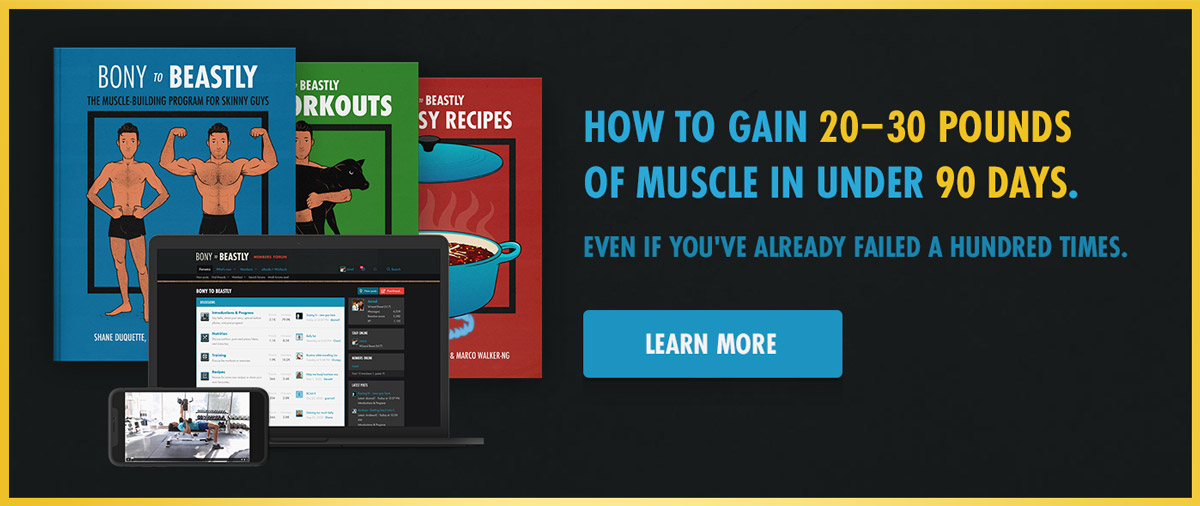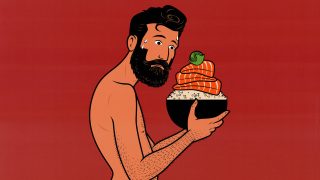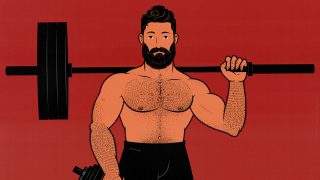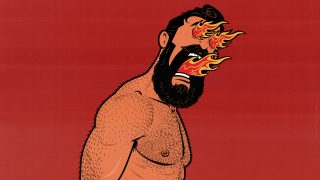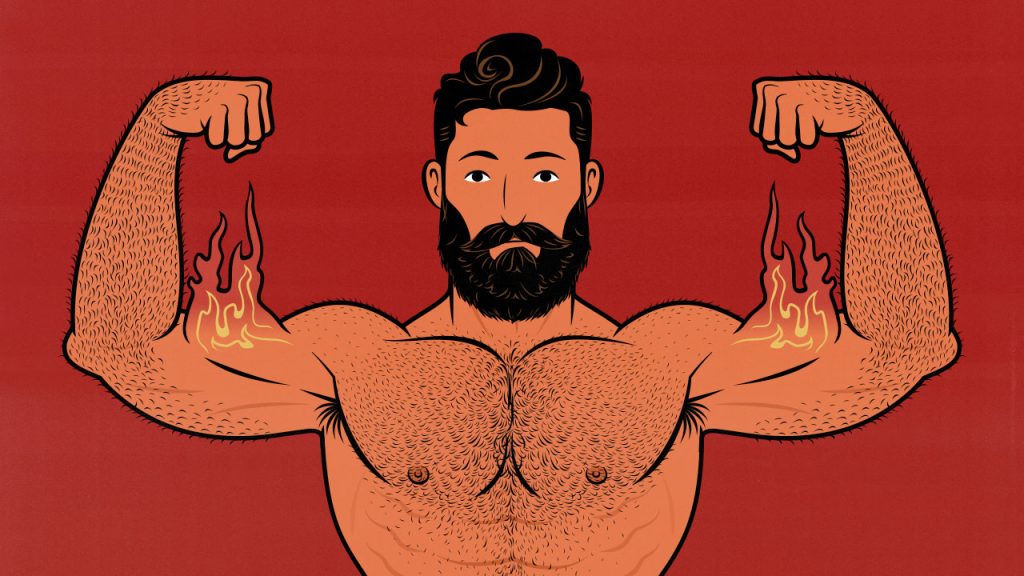
How Many Calories Does a Pound of Muscle Burn?
A pound of muscle burns around 6 calories per day at rest (study, study, study, study). However, it also takes energy to carry around and use those muscles. Your heftier leg muscles need to haul your beefier upper body around. This can double or even triple the calories your muscles burn.
All told, a pound of muscle burns more like 8–16 calories per day. I’ve given a full explanation below. I’ve also made a simple calculator.
Perhaps more importantly, I want to talk about the implications of burning those extra calories. Usually, burning more calories is a good thing. You get to eat more food, which means you get to eat more nutrients—more energy, but also more fibre, probiotics, and micronutrients.
However, many naturally thin people worry that to maintain the muscle they gain, they’ll be forced to eat an uncomfortable amount of food forever. I had that same worry.
To my horror, my worst nightmare came true. I gained nearly 60 pounds of lean mass, and my calorie needs went up by over 700 calories per day. To my great relief, it wasn’t anything like I expected.
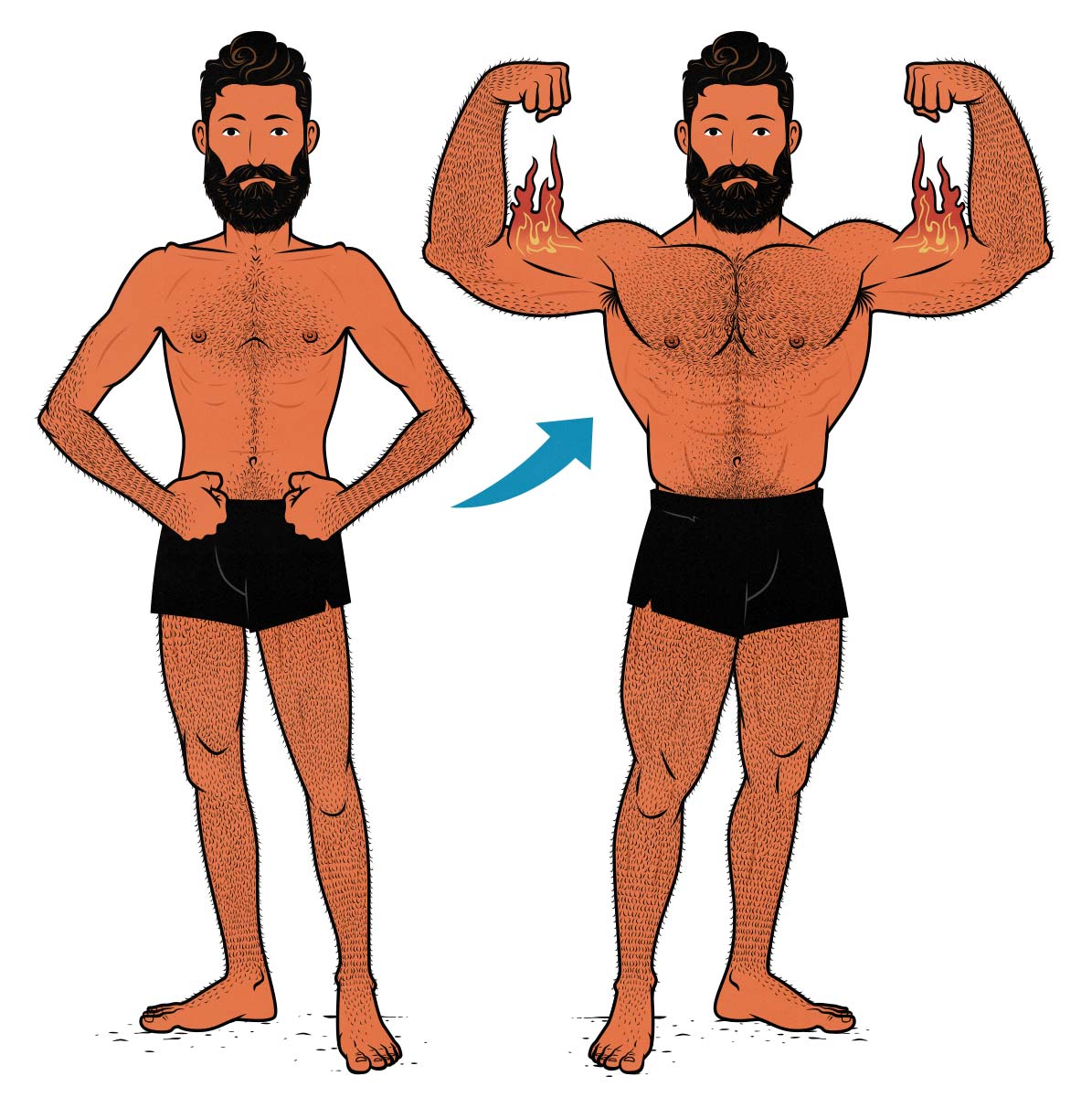
The Caloric Cost of Muscle (with Calculator)
When I first tried to figure out the cost of muscle, I used the Cunningham Equation and the Physical Activity Factor, giving me an estimate of 15 calories per pound of muscle per day. I knew I was oversimplifying it, though, so I asked Greg Nuckols, MA, how he would go about it.
Greg reviews muscle and strength research on his site, Stronger by Science. He also created the MacroFactor calorie-tracking app. Those two projects make him uniquely able to answer this question.
Here are the factors he considered:
- Lean mass burns about 10 calories per day at rest. Muscle falls under the category of lean mass, so calorie formulas like the Cunningham Equation assume that for every pound of muscle you gain, you’ll burn 10 more calories (study). That’s not quite right.
- Muscle only burns around 6 calories per day at rest (study). Muscle isn’t expensive to maintain. It’s fairly dormant, especially compared to an organ like the heart, pumping heroically all day long. Our brains, hearts, kidneys, and livers burn 100–200 calories per pound per day. They don’t weigh very much, but they burn enough energy to skew the average.
- We need to carry every extra pound we gain. That’s true whether that pound comes from bone, muscle, fat, or gut contents. The more active you are, the more energy you’ll use lugging your weight around.
- Dietary protein takes more energy to digest (TEF). If you’re eating more protein to support your extra muscle, you’ll burn slightly more calories. This is a fairly minor factor.
- Building muscle lets you lift heavier things (EE). When you build muscle, you become stronger, allowing you to carry heavier things. Carrying heavier things uses more energy. This is a minor factor, too.
So, overall, the Cunningham equation overestimates the cost of muscle at rest, putting it at 10 calories instead of 6. However, the activity multiplier still holds, and we need to factor in a couple more things. That brings my estimate of 15 calories down to 10–12 calories, at least for the average person.
We can do a bit better than that, though. I made a calculator that lets you plug in your muscle-building goal along with your activity level:
The Cost of Muscle
Calculator Tool
The answer isn’t perfect. It’s still just an estimation. But I can’t imagine a scenario where you would need a more precise answer than this. Even if you’re tracking your calories, this would get you more than close enough.
Is Building Muscle a Good Way to Burn More Calories?
There’s this old myth that a pound of muscle can burn 30 or even 50 calories per day. Muscle was praised for its ability to help overweight people burn fat while eating more calories. It wasn’t true, and it didn’t work, so there was a backlash, and rightfully so. But the pendulum swung too far.
Now the common thinking is that muscle burns too few calories to care about—that it can’t significantly impact our metabolisms. That isn’t always true, especially in the context of bulking.
- If you’re overweight, building muscle won’t significantly impact how many calories you burn. In fact, if you lose weight while building muscle, you may even burn fewer calories by the time you’re finished. After all, you’re carrying around less weight. Even if muscle burns 3x more calories than fat at rest (6 vs 2 calories), it doesn’t account for the energy you’ll save by hauling around less body weight.
- If you’re a thin guy trying to build muscle, that extra mass can have an enormous impact on your metabolism. The muscle you build is metabolically active. Plus, you need to carry around every extra pound you gain, including the food in your digestive system, the extra glycogen you’ll store, and any extra fat you gain. Even your bones will grow denser and heavier.
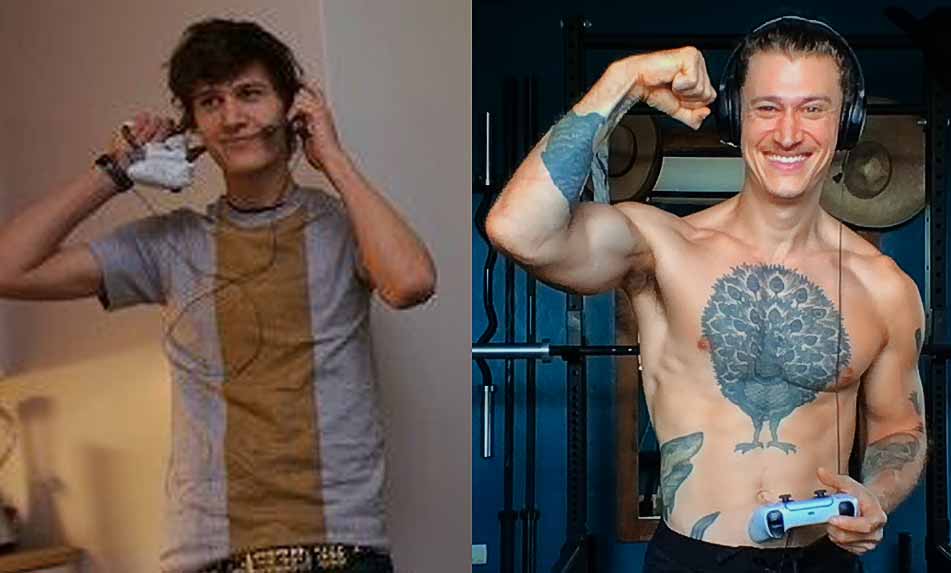
I’ve gained 60 pounds, most of which was muscle, increasing my calorie needs by around 700 calories per day. That’s the size of a large meal. My skinny self wouldn’t have wanted to eat another large meal every day.
Is It Hard to Maintain A Muscular Physique?
I spent my teens and early twenties clinically underweight, struggling to reach the healthy BMI range (above 18.5). I had trouble eating enough food to gain weight. It terrified me to think I might need to overeat forever. I’m not alone in that fear.
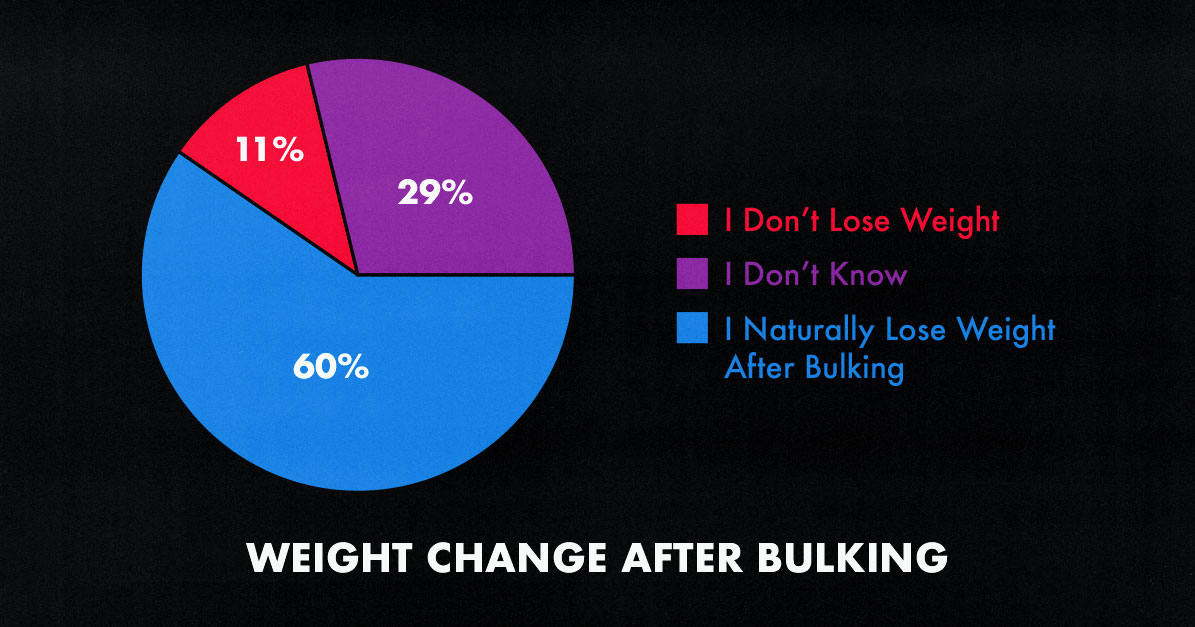
When we surveyed our newsletter readers, 58% said they wanted to go back to eating less food. 60% said they tended to lose weight after bulking. It’s normal for people with our body type to lose 5, 10, or even 15 pounds, depending on how much weight they gain while bulking.
We aren’t losing muscle, though. We’re losing gut contents, fluid, glycogen, and, of course, body fat. When we return to our natural body fat percentage, we stop losing weight. We’ve dubbed this process “Reverse Bulking.” I wrote an article about it on Bony to Beastly.
Seeing this happen over and over again in myself and thousands of others has led me to believe a couple of things:
- If you gain fat, your appetite won’t help you keep it. When you stop overeating, you’ll want to eat less food. The fat will effortlessly melt away.
- If you gain muscle, your appetite will increase proportionally, at least if you keep lifting weights, eating a good diet, and living a healthy lifestyle. Your body cannot afford to lose any muscle it still needs.
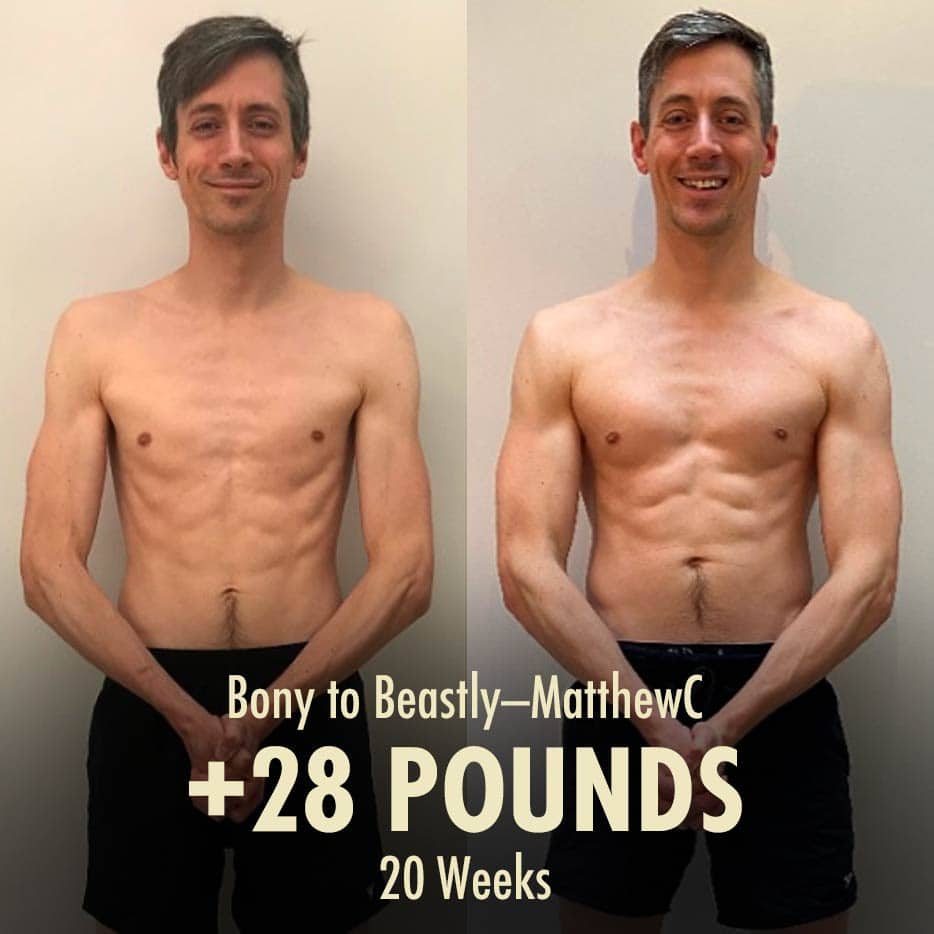
Overall, it tends to be healthy and enjoyable to maintain a muscular physique. Your appetite won’t necessarily help you maintain your weight, but it will encourage you to eat enough food to maintain your hard-earned muscle.
To my great surprise, the same appetite that used to help me maintain my 130-pound body now helps me maintain a 190-pound body.
Conclusion
A pound of muscle burns around 6 calories per day rest, though it also costs energy to use those muscles and carry them around. If you live a healthy lifestyle, a pound of muscle burns around 10–16 calories per day overall.
Fortunately, your appetite will keep up with your burgeoning caloric needs. As you build more muscle, you’ll want to eat more food. The extra muscle is a burden, yes, but only physiologically.

Alright, that’s it for now. If you want more muscle-building information, we have a free muscle-building newsletter. If you want a full exercise, diet, and lifestyle program to help you build muscle and improve your health, check out our Bony to Beastly Program (for men) or Bony to Bombshell Program (for women). Or, if you’re already an intermediate lifter, check out our customizable Outlift Hypertrophy Program.
